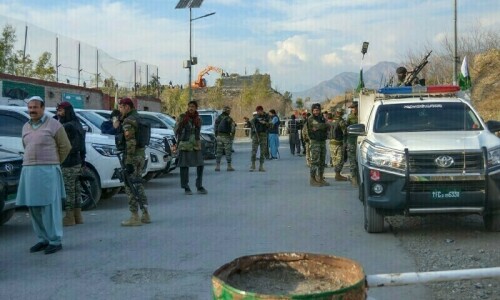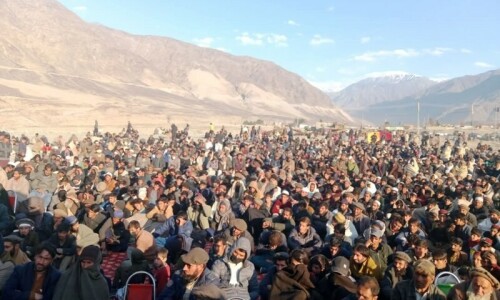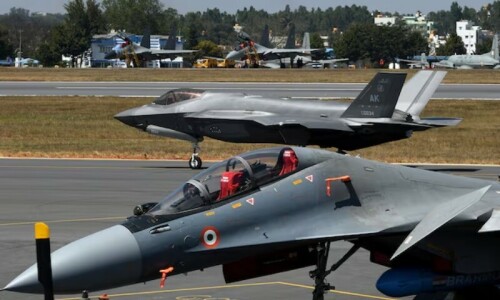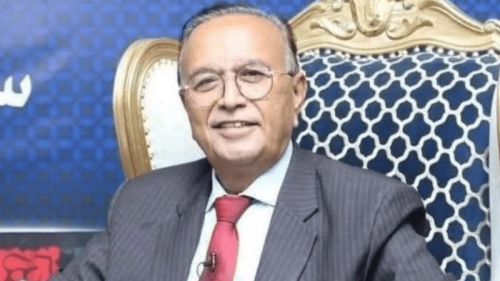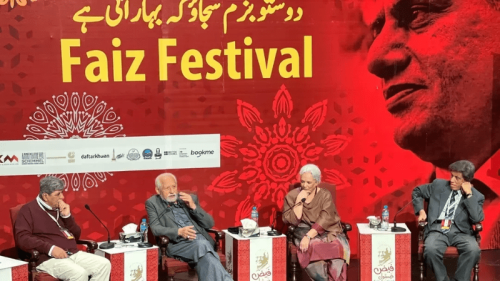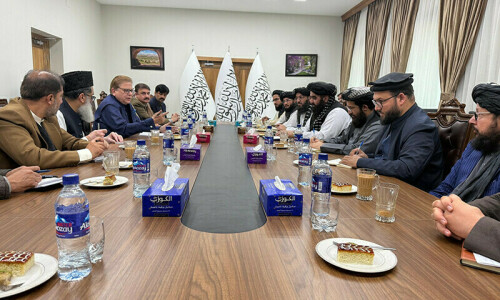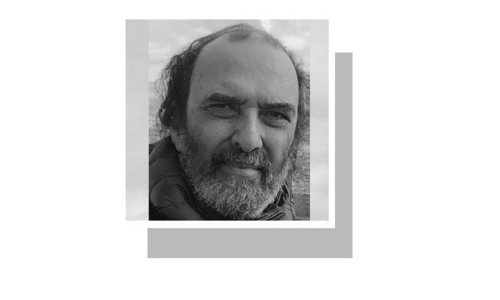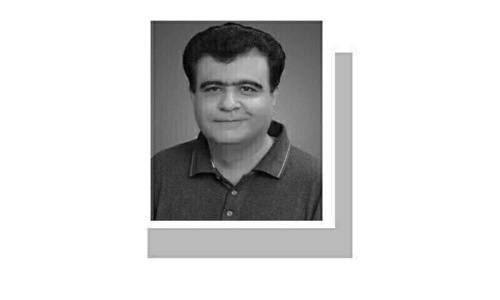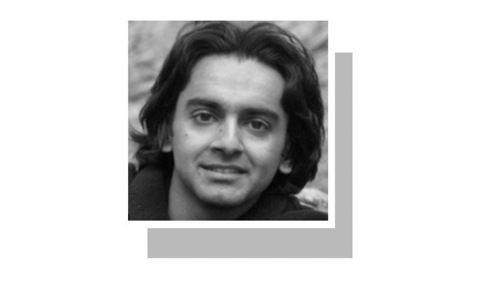Is there anything called a positive confusion? I ask this after assuming that confusion is inherently a not-so-comfortable (if not entirely) negative emotion.
Even if there is nothing so positive about confusion, sometimes it does have the potential to trigger something a lot more worthy.
Allow me to explain: In Pakistan a negative confusion has started to be overrun by a positive confusion that has the potential to generate clarity in thought and action that’s been missing for quite some time within the country’s politics, state and civil society.
We have all bemoaned about how an awkward strand of confusion has gripped the society regarding the nation’s understanding of all that has been transpiring in Pakistan in the name(s) of faith, honour, democracy, morality, justice, etc.
For example, till even the dastardly terrorist attack on school children in Peshawar late last year, the so-called apologist narrative that goes out of its way to subliminally obfuscate the malevolent deeds of religious extremists by pointing the finger at some elusive (and sometimes imaginary) forces, was clearly outweighing the narratives of those who were pleading to see the extremists as they were and still are: malicious beings, almost to the point of being nonhuman.
At times even the victims of extremist terror have not been spared by the apologists.
But, alas, the Peshawar attack that took the lives of over a hundred school children shocked the nation’s muddled state of mind and triggered at least some sort of clarity about where we had been all these years: in a state of convoluted denial and socio-political neurosis that continued to understand acts of psychosis as those of liberation, defiance, conspiracy, et al.
Why would Pakistanis give a fig about protecting warped concepts of faith, democracy, morality, justice?
Yes, this time the shock was far more real and lot more widespread, but this has happened before, hasn’t it? A brutal attack, sudden shock, condemnations ...?
But unlike in the past when terrorist action and peoples’ reactions were quickly diluted and deflected with the on-cue-arrival of the obfuscators (in the electronic and social media), this time around it was clear that the apologists’ narrative had been stretched as much as it could and was wearing thin, enough to finally break into many pieces.
It did seem like a sudden awakening that even left the government — headed by a party once accused of having sympathies with at least some batches of extremist groups — drastically shake off its paralysis and conjure some truly extraordinary legislation in the parliament and the senate against terrorism.
The truth is it wasn’t quite as sudden. The unfortunate episode of carnage in Peshawar just worked as a catalyst to unleash a counter-narrative that, though, has been building in certain social and intellectual circles and political parties, did not come into force as much as it has begun to now; or more so, ever since it began emerging in one of the state’s strongest and most influential institutions: the military-establishment.
The irony of it all is that over the decades, the military-establishment has often been accused of generating narratives and actors (for questionable ‘strategic purposes’) that have eventually turned into self-serving and anarchic monsters devouring everything in their path.
But quietly something in this regard began to change when Raheel Sharif became the head of the Pakistan Military Academy (PMA). According to a 2013 BBC profile of him, the general played a key role in presiding over a change of military thinking since 2007.
Being also an academic and strategist, his analytical deductions led to the insistence that religious militants had become a major threat to the state and to the armed forces and that the military needed to radically reassess and re-evaluate its strategy regarding the presence of militant groups on Pakistani soil.
The BBC report also quoted some of the general’s closest colleagues as saying that during his last tenure at the PMA, he reshaped nearly all the important training courses, bringing them in line with the challenges of internal terrorism.
When he was selected to become the country’s new Army Chief by Prime Minister Nawaz Sharif, the PM was quite aware of the inevitability of the coming conflict between the state and the militants.
While going through the futile motions of ‘peace talks’ to exhaust his party (the PML-N) and that of the PTI and of the religious parties’ mantras of striking peace with a rather anarchic enemy, the PM chose an army chief who was perhaps the clearest in his head about how a cohesive military, political and even intellectual battle had to be fought with such an anarchic and yet organised foe.
With this coming to pass, what is emerging now is a positive confusion. This confusion is different from the one that it seems to be replacing, but it’s still confusion — though prone more to evolve into becoming something a lot more clear and less awkward.
To begin with, this is a confusion submerging those who for years have insisted that the confusion related to the issue of religious militancy and terror in Pakistan is not confusion at all but something less diabolic. But they are the ones now who seem suddenly confused.
The source of their confusion is General Raheel Sharif. He seems to be a self-consumed character, a thinking man’s soldier, entirely focused on and sure about a robust doctrine he’s been developing for years.
He’s also not an exhibitionist and keeps his cards close to his chest because after all he’s trying to unfold a doctrine that is challenging various dogmas doing the rounds in the armed forces ever since the days of Gen Zia in the 1980s.
It is this and his psychological disposition that make him come across as an enigma even to those who once thought were close to the military-establishment. Though he has successfully driven the PM and the parliament to become important parts of a doctrine aimed at whipping out militancy and terror in the country, his drive and mystery have also left some sections feeling confused.
And the confused in this regard include the two most recent vocal shapers of national narratives in Pakistan: The religious parties and the judiciary/lawyers.
The religious parties have been enjoying a long run ever since the 1980s to determine what it means to be a ‘good Muslim’ (and thus a patriotic Pakistani), whereas the judiciary and the lawyers came into prominence after the 2007 ‘Lawyers Movement’, believing they have finally figured out how to deliver ‘true democracy’, constitutionalism and justice in Pakistan.
Of course, many things have gone terribly wrong in both the cases because the country continued to plunge into an abyss. Nevertheless, as a majority of Pakistanis quite clearly like what Gen Sharif and the parliament are now promising to do, the lawyers (who promised some sort of a judicial utopia in 2007) and the religious parties (some of who behaved as if criticising the militants was akin to criticising Pakistan’s Islamic republic-ism), have both gone into a confused tailspin.
Parties such as Jamaat-i-Islami and Jamiat Ulema Islam (both once considered to be close to the military-establishment) are throwing up their arms, fearing the emergence of a ‘liberal Pakistan’ and a very different ( post-Ziaist) general, while the lawyers are feeling insulted by the emergence of military courts.
Now, the question is how much do the completely stressed out people of Pakistan really care about safeguarding certain entirely abstract notions of faith, democracy, morality, justice? And for what — the pleasures of a hearty debate followed by the horrors of anarchic carnage? Please.
Published in Dawn, Sunday Magazine, January 11th, 2015
On a mobile phone? Get the Dawn Mobile App: Apple Store | Google Play



